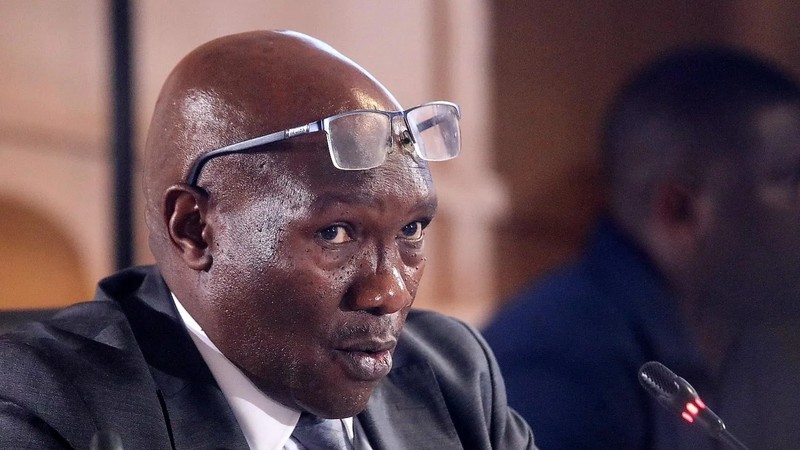The SAPS has denied knowledge of any claims suggesting crime intelligence boss Lieutenant General Dumisani Khumalo’s illness might be linked to poisoning.
This comes after social media speculation about foul play surrounding Khumalo’s sudden illness.
Khumalo’s health condition remains the subject of speculation after it was announced he will not testify on Monday at the Madlanga Judicial Commission of Inquiry as previously planned, following a week-long adjournment.
On Friday, SAPS national commissioner Fannie Masemola said during a media briefing that Khumalo’s health “is improving and I am sure he will come by”.
When questioned about social media claims that Khumalo might have been poisoned, the SAPS national spokesperson Athlenda Mathe said: “We don’t know about that. Nothing suggests that. I am not aware of any claims.”
The Commission, investigating corruption and political interference in the justice system at the Brigitte Mabandla Justice College, was adjourned on October 1, 2025 due to Khumalo’s sudden illness during his third day of testimony.
The Madlanga Commission took a scheduled break from October 6 to 10, 2025, due to Commissioner Sesi Baloyi’s unavailability, who attended to her duties as a member of the Judicial Service Commission.
Commission spokesperson Jeremy Michaels announced that due to the sensitive nature of upcoming evidence on Monday, the evidence leaders will apply for tomorrow’s hearing to be held in-camera, excluding the media and public.
“In view of the nature of the evidence to be presented when the hearings resume, the evidence leaders will apply for the hearings to be conducted in camera, in a closed session at which the media and members of the public will not be allowed. If the Commission grants the application, the hearings will then proceed in camera until further notice,” he said.
He clarified that Khumalo is not scheduled to testify during this upcoming session.
“The Commission remains committed to the principles of transparency and accountability. Should circumstances permit a change in the mode of hearing, the media and the public will be informed accordingly,” Michaels said.
During his testimony at the Commission, Khumalo, also head of the Political Killings Task Team (PKTT), implicated businessmen Katiso “KT” Molefe and Vusimuzi “Cat” Matlala as alleged leaders of the Big Five cartel, accused of infiltrating South Africa’s justice system and politics.
Molefe, who appeared in the Johannesburg High Court on Friday, was granted R400,000 bail, overturning the Alexandra Magistrates’ Court’s decision that had denied him bail on attempted murder charges.
Khumalo testified at the Commission that the investigation into the other three alleged Big Five cartel leaders is ongoing, and their names have not been disclosed yet.
He explained that these cartels typically have a hierarchical structure, with a leader supported by a core leadership team, and operate through smaller syndicates consisting of at least 10 members.
The main activities of these syndicates include drug trafficking, cross-border vehicle hijacking, tender fraud and extortion related to drug trafficking.
According to Khumalo’s testimony, records from Matlala suggest direct payments were made to North West businessman Brown Mogotsi, an alleged close associate of Police Minister Senzo Mchunu.
Mchunu initially denied knowing Mogotsi in a parliamentary hearing but later admitted to knowing him as a “comrade”.
Khumalo stated that some payments were for ANC event expenses, which seemingly benefited Mchunu through his chief of staff, Cedrick Nkabinde.
Nkabinde, whose home was raided by police on Thursday, claimed that a group of heavily armed men assaulted his brother while searching for him.
On the same day, a suspended deputy National Commissioner Lieutenant General Shadrack Sibiya’s home in Centurion was also raided.
Sibiya claimed he was under constant surveillance and felt “under siege” after electronic devices, including a laptop and cellphones, were confiscated.
Sibiya has been accused of advocating for the immediate disbandment of the PKTT, established in 2018 to probe politically motivated killings, despite having no involvement in its operations.
Khumalo alleged that the push to disband the PKTT was influenced by an organised crime cartel over the police ministry.
Lieutenant General Nhlanhla Mkhwanazi, SAPS Commissioner for KwaZulu-Natal, testified that Mchunu ordered the disbandment of the PKTT in a December 31, 2024 letter, citing the unit’s alleged lack of value to policing.
Mkhwanazi said: “The minister’s conclusion that the team does not add any value to policing in South Africa was misplaced.”
